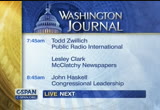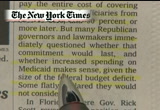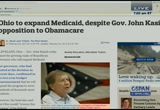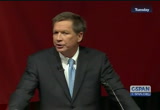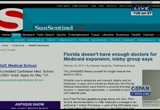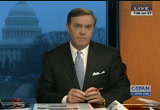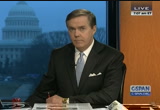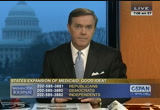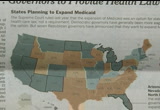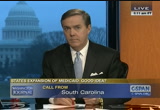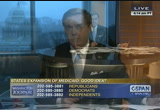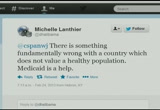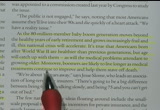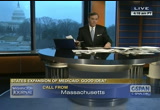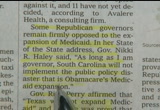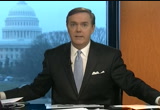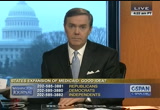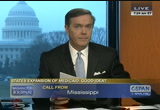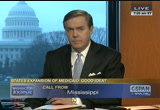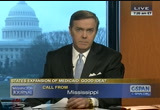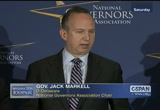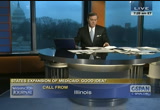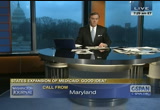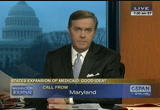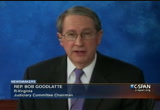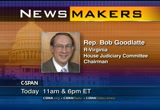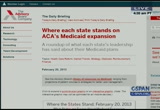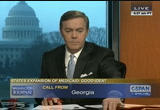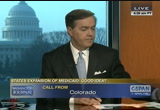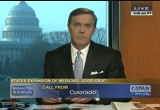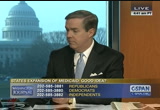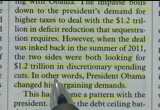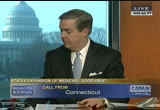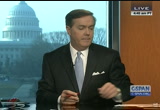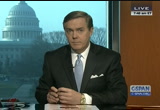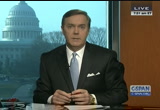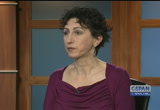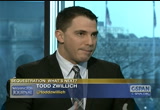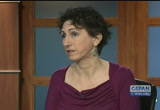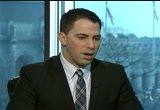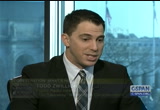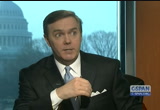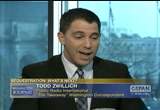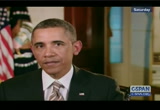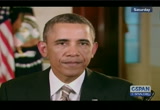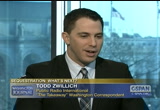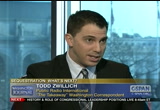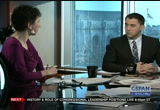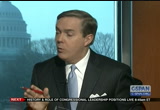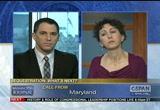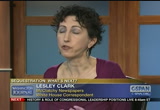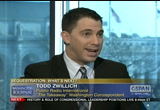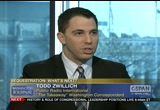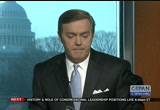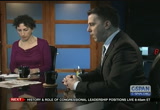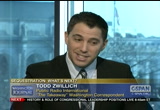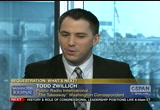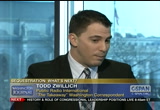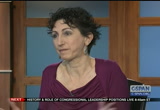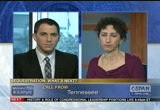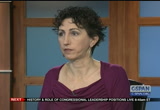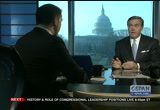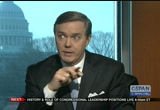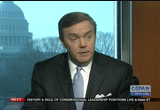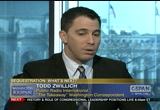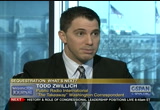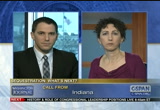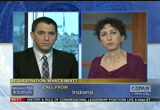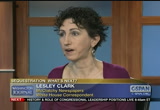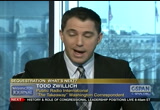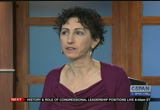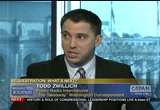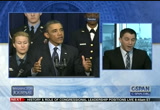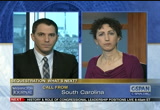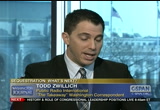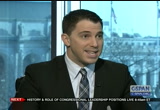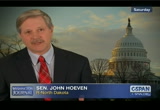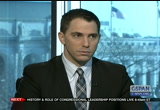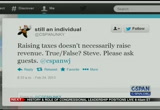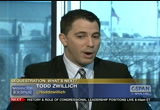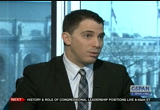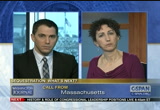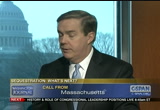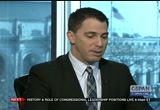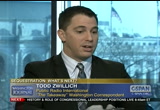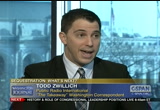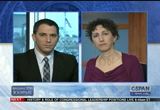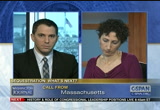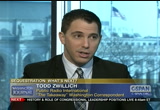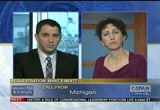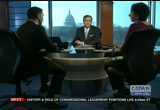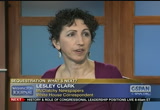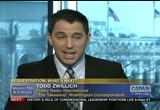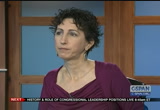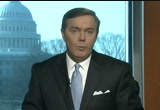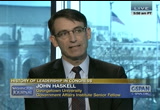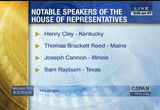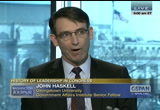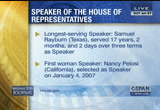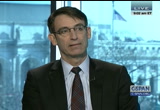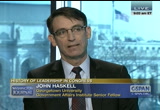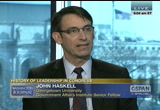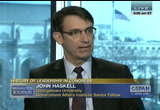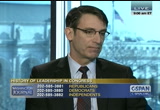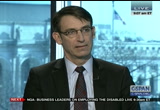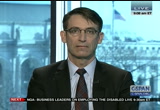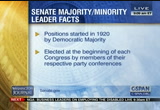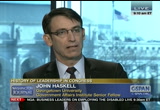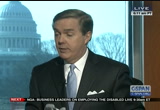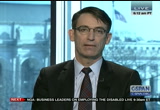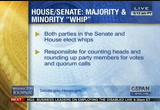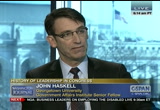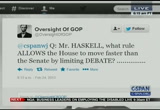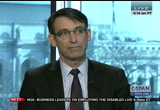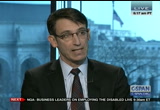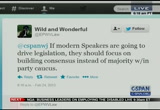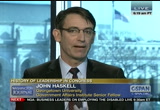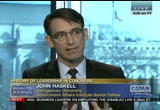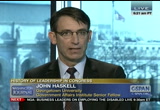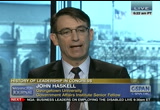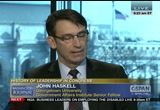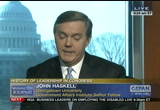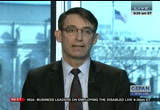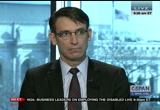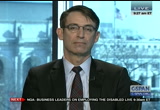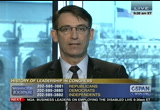tv Washington Journal CSPAN February 24, 2013 7:00am-9:30am EST
7:00 am
and later, john haskell from georgetown university talks about the role of the ♪ >> a live at view of the u.s. capitol the sunday. the nation's governors continue their winter meeting on sunday. congress returns tomorrow with the senate. chuck hagel is expected to be the next defense secretary. a boat could happen early as tuesday. and those automatic budget cuts -- budget cuts begin to kick in. on the sunday, often during, 24, we will begin with the topic of health care.
7:01 am
specifically, medicaid. is it a good idea? we want to get your thoughts on all of this. 202 is the area code. 585-3881 for the republicans. 202-585-3880 is our democratic line. you can also join us at facebook or send us an e-mail. a couple of issues dealing with health care and the elderly. a cover story, "increased -- a crisis in plain sight." and this cover story from time magazine called, "why medical
7:03 am
there is the story of one of a number of republican governors -- he said ohio would reverse this decision if the government failed to cover all the cost of the expansion. here are some details for ohio -- last year the supreme court ruling that they have the ability to tap in and out of the system. medicaid covers 2.2 million people in ohio. it is the single largest program in the state with a two year budget. it accounts for roughly $18.7 billion, or 32% of the more than $55 billion budget. junkies to talk about medicare and medicaid as a way to deal
7:04 am
with the issue that a number of governors are now focusing on. here is from last tuesday in lima, ohio. >> this state wanted mom and dad to have the resources to stay in their own homes if they were able and not be forced into a nursing home where they can stay in their own homes where they would be more independent, more healthy, more independent, at a much lower cost. for 25 years this effort was made to fix this. we did it, didn't we? now mom and dad can stay in their own home and they can be healthier. we won that battle. [applause] 4% of medicaid recipients dropped over 50% of the costs. their care was not coordinated. it did not make much sense to
7:05 am
them. the you know how complicated it is for all of us to be in a position to understand the ins and outs of health care? we are now coordinating the health care of that 4%, so their care is not coordinated the logical and they are healthier. the whole country now is looking at our program. we have slowed the growth of medicaid to 3.2%. unthinkable in many plants -- in many places in this country. other states are looking at what we have done in ohio to make the system work better. that is the way you move to balance the budget. host: florida is another state where expansion of medicaid will take effect with republican rick scott, who will be our guest tomorrow morning. the headline from the "sunsentinal," --
7:06 am
the florida medical association saying there is a growing shortage of doctors. if the florida legislative does go with rick scott's recommendation to offer medicaid under the affordable care act, they are saying the shortage will only get worse if the figures -- florida now has 5600 doctors expected to retire in the next five years. obama-care could add -- it would only worsen in the years ahead. from arizona, welcome. caller: thank you. i would like to mention some key points in governing -- say, the
7:07 am
democratic governing versus republican governing. i like to take a few minutes to get everything together and have an understanding as to what governing means, what government tries to do and the obstructions that the republicans have caused four at least 33 years to try and -- let me start out by saying we need to be led in the country, and if we elect somebody to lead us, please let him lead us. if our air elected representatives cannot lead us than we have approximately over 310 million systems of government, which is bought of government in the last 30 years. host: we do really want to focus
7:08 am
on the issue of medicaid expansion. there is this. maria is joining us from west hill, new jersey. the morning. caller: think medicaid could be center for our citizens. i feel that the 33 million illegals are going to be a -- are going to be given a pat to citizenships. it is going to be a disaster for our country. we have to stop all emigrations -- all immigration. that has to be addressed before we go -- it is going to crush our own people. host: you can join the conversation. 202 is the area code.
7:09 am
7:10 am
from north charleston, south carolina on the democrats' line -- a good morning. caller: i do believe it should be expanded. based on health care not being expanded. we have had some serious issues. we should be expanding with what is going on in our particular state. host: i'm going to go back to "the new york times," -- those states that are opting out of it include pennsylvania, possibly virginia, north and south carolina, georgia, you can
7:11 am
see other states like florida and ohio, opting in to the program. michigan is opting in to the program. gov. rick snyder is our guest tomorrow. there are republicans governors saying yes to the expansion, including arizona and nevada. good morning, where are you calling from? caller: charleston, north carolina. our governor is sitting in her first term. she turned down the medicare proposal. they told me i make too much money to qualify for medicare.
7:12 am
from this -- from the rest of south carolina, we have several different problems. the congressman see is coming up in the first district. a lot of people are starting to line up against the party line. host: thank you. join us online at twitter.com. from florence new jersey, independent line. good morning. caller: i want to give you what the real problem is. it is not all of the people doing these things. it is government going into things it should not be going into, taking money, and then putting it back. they are the problem.
7:13 am
host: joe from south carolina, independent line, good morning. caller: how redoing? -- how are you doing? we get a support him and what he is doing. host: we will have live coverage of the nga winter meeting at 9:30 eastern time. the focus in the morning session is employing individuals with disabilities. the afternoon -- the afternoon session will be focusing on education issues. the president will be hosting the governors tonight at a state givedinner. next call is from mississippi. good morning.
7:14 am
caller: thank you. the comment that i want to make is that the opponents -- the people for and against the medicaid expansion are being short-sighted on what the president is really trying to accomplish, not only through medicaid but overall. the affordable health care act is trying to get more low income people insured. it is trying to make us compete globally with other countries who have more single payer insurance plans.
7:15 am
if we can lower our costs of health care on businesses -- we can expand the single-payer. now it is kind of a burden on the businesses. we can accomplish something close to single-payer and then the burden on the businesses will decrease and we will be able to compete better globally than we are doing now. host: michele has this point -- let me go to jane norman's pc. i will share with you a couple of points she makes --
7:16 am
7:17 am
marcus joining us from michigan. good morning. caller: i believe the biggest problem of all of this is the price. the cost. a 5-minute doctor visit costs me $209. it costs you, the american taxpayer. don't you think that as a little too much? host: thank you for the call. you can make $31,000, on a $500,000 home and still get medicaid. jane is joining us from arkansas. good morning. caller: i just wanted to state that it seems kind of strange that the states that opt out of
7:18 am
this medicaid expansion -- the citizens of those states are still paying federal taxes, so they are paying for other people to get medicaid in other states. they ought to pay for their own people. medicaid has kind of a stigma. that is my comment. host: richard is next joining us from massachusetts. good morning. caller: i think medicaid should be eliminated. i am sick and tired of people thinking they can deserve everything. my wife's niece is on it and she has three kids from two different guys. she gets whatever she wants.
7:19 am
i am tired of you people in america. get a job. stop looking for free food. host: thank you for the call. if you are joining us on c-span radio, we are talking about this state expansion of the medicaid program. the supreme court decision allows states to opt in or out of the program. a number of republican states are doing so, including florida and ohio. some republican governors to provide a health care law list. i will share you -- i will share with you a couple of points.
7:21 am
it goes to show you that the system will not grow broke. it allows people to see how these nonprofit hospitals are taking advantage of the system. medicaid and medicare put restrictions on the guidelines that the government has in place. it is very enlightening. it is not fiction. it is fact. i do not see anything wrong with people being provided with health care services. i am on medicare myself. my primary became medicare.
7:22 am
the bills that they have is out of line and their cost is enlightening. when hill college -- until costs $1.58. this is going on in our system by the drug -- yes you get hospital plans within our system -- not hospital but insurance plans. the enlightening thing i found in this magazine is that they are making good money when the insurance companies within the systems regulate their costs. they are still gouging way above what the costs would be and
7:23 am
still make a good living, whether it be in the hospital and or the doctors. i do not see anything wrong with people needing medical attention that do not have any resources. they just sit over in the corner and die because they are older folks? that is a sad situation. it is insurance, it is the medical fields -- just have people pick up this magazine. host: this is what it looks like. it is titled "bitter pill." we are focusing on at the expansion from medicaid. if you go to advisory.com, it is
7:24 am
one website that shows you which states are and are not participating in the expansion of the aca. there are 13 states not participating, alabama, georgia, idaho, louisiana, maine it, mississippi, north carolina, oklahoma, pennsylvania, south carolina, south dakota, and wisconsin. and there are five states leaning to not participate, iowa, nebraska, virginia, wyoming -- will go to sharon who is joining us from mississippi. good morning. caller: i was calling to say i believe medicare should be expanded, not medicaid. around here i see maybe one in
7:25 am
eight that deserve to be on medicare. i see people with six to eight children who do not even know what the father is and they go to the hospital. my friend's husband had cancer. all of these medicate people were using it for their primary care physicians. she never knew which one was sick. they were on medicaid. they were not people that really needed the care. he had to sit in two hours in paint. my husband had an aneurysm and would not get on disability because he did not want to work
7:26 am
the system. he has had to go back to work to pay for all of this mess. we are paying for is sin. they absolutely have no scruples. the general public is sick. host:how is your husband doing now? caller: he is doing okay. it was a miracl.e he is not going to work the system. all of these people saying they cannot get a job, you can get plenty of jobs here. host:, for the call.
7:27 am
from our twitter page -- the democratic governor of delaware and here for the nga, he was joined by his vice chair. they held a news conference on -- conference and the issue of medicaid came up. [video clip] >> this not democrat, this is not a republican, for us is to have the opportunity to expand. a lot of people who otherwise would not have had access to affordable care will now have access. in addition, for us, we are getting a higher reimbursement for a portion of the population. host: from yesterday's news
7:28 am
conference, the focus is the expansion of medicaid. this is the headline from friday's "new york times," -- jack is joining us from illinois on our line for independence -- for independents. caller: we are not paying medicaid bills now. they borrowed money to pay for them and we are not even paying now. how is this going to help us at all? host: did you have a final thought? caller: if they pick up the whole bill, will pick up the past bills? host: under the current plan will cooper -- under the current plan they will cover 100 percent
7:29 am
of the costs for the next three years. host: we are already very badly in debt here and they are borrowing money to cover it. thank you. host: thank you for the call. steve is joining us from maryland. good morning. caller: thank you for taking my call. i think it is a good idea that they expand medicare. my wife is in a nursing home with advanced dementia, respiratory problems. i was my wife's caregiver. i did whatever i could to keep my wife home. the costs were just too much. i could not do it anymore. for the last two years my wife has been declining in health.
7:30 am
i am unemployed, i gave up my work to take care of my wife. i have not been able to get work since. i think people ought to show a little compassion. host: how old is your wife and how long has she been battling dementia? caller: my wife is 13 years older than me. she is 79. i'm 67. the whole thing has been very tough. any program is going to get abused. i went through a very rigorous and out of paper work to qualify. you sign up and you get at it. if i am living on $1,000 per
7:31 am
month how can i keep my wife alive or give her some kind of comfort? i do not like to hear these people calling up and knocking the program because the government or the states are trying to take care of people. would you going to do with people like that? that is all i can really say. i wish you a nice day. host: thank you for the call. let us turn our attention to guns. a couple of stories relating to that this morning. new york has a population of 8.2 million, chicago has two 0.7 million. new york has 35,000 cops, chicago has 12,500.
7:32 am
7:33 am
program. [video clip] >> we are not saying we are not going to be looking at a new gun laws. the national instant check system is up for reauthorization at the end of the year. this is a perfect time to look at ways we can improve our background check system and do more to keep weapons out of the hands of criminals and people with serious mental illness. we do look at -- we do want to look at ways to improve the law, both in the instant check system and in terms of the illegal sales of firearms tha. it is brought down from 11,000 to 7000. there are laws on the books right now that prohibit the illegal sale of firearms to people that should not be buying them. they're just not being enforced
7:34 am
as well as they could be. >> if i am hearing you correctly, perhaps the broader house will indeed consider gun legislation this year. will the senate move in tandem with them? >> when we feel that we have the right information -- obviously we are interested in what the senate does. we are hard at work on this issue right now, studying information available and recognizing that because -- we need have a reauthorization of this law by the end of this year. we have every reason to look at how well it is working and any way we can improve it. host: "for the washington post," -- newsmakers airs today
7:35 am
at 11:00 eastern time on c-span and c-span radio. let it go back to the website advisory.com. this has a pretty good list of where states stand in terms of medicaid expansion. the state's that are opting out, there are 23 states that are participating in the program. the states, arizona, arkansas, california, colorado, connecticut, delaware, florida, hawaii, maryland, massachusetts, michigan, mrs. -- minnesota, montana, nevada, new hampshire, new mexico, north dakota, ohio, vermont, and washington state. we will be talking about this issue on c-span's "washington journal." from arkansas, could warning. caller: i am calling in for the
7:36 am
medicaid expansion. there is a lot of government waste. there is a lot of government spending that is not good. but there are some people that are truly disabled. they cannot work. they require medicaid to cover their co pay for their medical bills. it is the people that do not have any pride to our social lists that are draining this country. it hurts the good people that need it. host: if you go to cnsnews.com, the headline --
7:37 am
feds will assume 90% of the cost after 2014. we are asking you about the expansion of medicaid as states decide whether to opt in or out of the program. riverdale, georgia, independent line, good morning. caller: you do have people that abuse the system. the gentlemen before dave rigorous processing to make sure that people are not abusing the system. i think that medicaid is a very great system. i think not everybody is able to work and we have a lot of sick people. what is there to do?
7:38 am
i think the reason our nation is being drained so fast has more to do with big military spending. if you get those two elements, people will be able to prove it -- will be able to survive a bit more. thank you very much. point --kass' this jack has this point. this is the final week for pope benedict as he steps down officially at the end of this month. two of the headlines suggest internal struggles within the vatican. some speculating the next pope could be from africa.
7:39 am
"usa today," has an editorial on what medicaid expansion means for individuals. governors deciding to accept the medicaid expansion in the affordable care act, bringing billions of dollars of federal funding to their states and ensuring access to medical care for thousands of their most vulnerable citizens. 15 states still refusing to participate could do well to follow suit, giving people health insurance improves health outcomes. ted is joining us from colorado. listening tobeen all of this. i am a consultant in a hydroelectric bill.
7:40 am
i have great friends, teachers and other people that are in the petroleum industry. all of them sit back and listen. they are very slow with their thoughts. the whole thing about expanding medicaid -- we have had medicare for years. my grandfather was a world war two veteran. he is diagnosed with alzheimer's and they cannot get benefits because there is no dating on the paperwork. the care giver she has now has problems getting paperwork in on time. the simple solution to all of this is people work to take care of themselves. i did not work to take care of my neighborhood.
7:41 am
i do not work to take care of my -- i did not work to take care of you. america has worked to take care of itself for years. people have forgotten that this nation became great because we do not stand on the lines of "and the government will take care of us." the nation has stood for independence. the nation has done good on the will of man. host: the bottom line, you say do not do it. caller: i say do not do it because i do not take care of my neighbor. i will help my neighbor. but i will not support him. host: thank you for sharing your point as we get on with your calls and comments and opinions on this.
7:42 am
"the weekly standard" has a different standard. he points out when it comes to a number of issues when it comes to foreign policy issues, he is not a good partner for constructive governing. even in areas where there might be agreement. he points out that the current battles of sequestration is a perfect illustration of the challenge republicans face in dealing with obama.
7:43 am
back to your phone calls. george from connecticut. republican line. caller: i'm still on the medicare expansion -- i think the system is pretty well funded now. what we have to do is take out the fraud on people who are abusing it. i live in connecticut and basically we are the welfare capital of the world. one of the biggest problems is if we do not bring jobs back to the country, we cannot improve their lifestyle. they have nothing to do. we have to look at jobs so we can educate them. host: i want to show you a
7:44 am
photograph on the front page of "the new york times," -- these are members of one syrian family living in a tent. it is a piece from the new york times, swollen with syrian refugees -- local officials and aid workers say the actual number of syrians living in lebanon is four hundred thousand. it is saturating the country of lebanon. another story we want to bring your attention, iran says it has found new uranium deposits. this is just days before resuming talks over the disputed nuclear programs. iran saying --
7:45 am
7:46 am
communications for a local hospital. i am a compassionate man. i am no fool. i saw all of the prices and salaries come across the computer on a printout every week. an example of one of the abuses i thought was a thing they called a "welcome tip." it consisted of a 2.5 inch can of shaving cream, one disposable razor, and one moist towelettes. every patient got the as -- got those. the price was $37, that was charged to insurance companies. i have no problem paying
7:47 am
salaries to the doctor. they are getting their education and experience. hospital administrators, members of the board, they sit on multiple boards and they get paid millions. before we do this expansion and get carte blanche on this the government should actually go in and audit the insurance companies and the hospitals because the abuse is in the system. host: let me go back to steven one of theece -- most expensive aansive stories e " magazine. initial doses of chemotherapy, $83,900. charges for blood and lab tests
7:48 am
amounted to more than $15,000. $77 charged for each of the sterile gauze pasds. these are just a couple of examples that are part of the larger issue of health care. we are focusing on medicaid and state expansion but all that plays into this. host: i understand. let us that i am a compassionate man. my son had to have a procedure that lasted two hours. the doctor was paid -- you get an itemized bill. the doctor was paid $4,200. the toll charge was $72,000. fortunately it was picked up by my insurance, and i am afraid to
7:49 am
retire because i will not be able to afford to retire. host: thank you for sharing your thoughts. we will go to john in just a moment. here is another headline -- the philadelphia inquirer is looking at the next pope. the conclave gets under way early next month. from "the boston sunday globe," there is the story looking at gun violence. a local couple reflects on the loss and power of faith. and this from "the miami
7:50 am
herald," a look at the election problems in the state of florida. john is joining us from wisconsin on the democrats' line. good morning. caller: thank you for taking my call. i live in wisconsin. i think what we need is a watchdog in each area that will eliminate some of these freeloaders. you see where people get into the system -- they get a free ride that continues on to the next generation and the next generation and they think nothing of all of getting a job. we have a furniture manufacturer who is offering sign-on bonuses to employees.
7:51 am
there should not be these able- bodied people who are getting in the system and staying generation after generation. there are a lot of companies that went out of the country, which eliminates a lot of jobs. our to permit is not working together to control this and keep our jobs here. this cost us a lot of money. thank you. host: one final comment from our twitter page, there is this -- thank you for sharing all of your thoughts and comments. "newsmakers" is at 11:00. we will have more coverage of
7:52 am
7:53 am
>> at age 25, she was one of the wealthiest widows in the colonies. during the relic -- during the revolution she was considered an enemy by the british, who threatened to take her hostage. the issue would become our related -- our nation's first first lady. meet martha washington monday night. we will visit some of the places that influenced her life, including colonial williamsburg, mount vernon, valley forge, and philadelphia. be part of the conversation about martha washington with your phone calls, tweets, and facebook posts. monday night at 9:00 eastern.
7:54 am
>> i think it is accurate they do not play by the rules. i think they bend the rules to fit their circumstance. think westerners tend to be a lot more legalistic, we want things on a contract. we think that is the be all and end all. the chinese will sign any contract or agree to any trade agreement and then they will try to figure out a way to interpret it to go out and get its requirements. it is just a relentless drive to try to get ahead. they see some of the coup scriptures that we put on them in terms of trade, in terms of these agreements. they see that as we are trying to hold chinatown. we basically operate in a role -- in a world without rules and now that we have gotten to the top we try to hamstring them are
7:55 am
tied them up in a knot of rules and regulations the whole china down. >> former pop -- former washington post correspondent keith richburg on 40 years of reporting. tonight. "washington journal," continues. host: good morning, thank you for being with us. sequestration set to take effect on friday as budget cuts begin to kick in. will it happen? guest: i believe it will. i do not see any movement towards owning it. host: wide guest:? both sides a pretty much dug in and there hasn't been much compromise in most of the arguments. host: this is from "the washington post," --
7:56 am
the transportation department has a $72 billion budget as of this is only 2% of the overall budget. republicans say the effects are not immediate. guest: what you're going to see the it industry's and doing more this week is what is called the outside game, going directly to the public. the president has been making a couple of campaign style speeches. he is going to continue that this week, talking about military cuts. we are going to see more cabinet secretaries talking about real- world effects on real people. the point that they want to make to people in the public is that this is more than just a washington argument. when these cuts are made the effects will be on real people in real programs. nobody likes when their flights are delayed.
7:57 am
it is going to get a lot worse. the president is at the home of the u.s. navy fleet to try to make the point directly to the american public. if those republicans would just agree to what he calls a balanced approach -- this is an old argument. this is another chapter in an old argument. if they would just be balanced we could avoid all of this pain. that is the message the administration will be sending. is from "the newhis york daily news," -- guest: republicans say do not believe the hype. it is not going to be as bad as everyone says it is going to be. people will be furloughed for
7:58 am
maybe a day or a week. other cuts may happen sooner. the president is going to be heading to a ship builder, so they are hoping to get some coverage of how this is going to eventually trickle down to the small business person in every one of the states and try to localize these cuts. host: also a good way to get people to call their congressmen. as you pointed out we have been dealing with this with the 2011 budget debate, also the fiscal cliff. even during this economic recovery, one industry thrives -- the manufacturer of synthetic hysteria. guest: we have heard it before. it has been this way for years. once the economy tanked it became time to rebuild and the debt exploded.
7:59 am
we are in an era of government where the president and democrats and the political forces that are most powerful in the republican house of representatives do not have any common grounds on fundamental economic policies. a lot of people around town on both sides of the aisle will tell you that the old way of reaching an agreement on this issue -- it is not the first time we have done that reduction. even though it seems like it is overdue, the old way of reaching agreements -- consensus is not attainable anymore. crisis to crisis. we had a debt limit which forced is up against a potential crisis there. guest: the fiscal cliff which is governing by crisis. guest: that is exactly right. this sequestration -- they are
8:00 am
baked into the law simply because of past failures. because of congress and speaker boehner new there was no consensus. they put these cuts which nobody liked in to the law. if we so far that has not worked. things are worse the the threat of sequestration. guest: senators and representatives tried to come to an agreement. now it has been kicked down to hire leaders. host: so far, wall street has reacted to this. they think congress will figure out a way or the cuts will not be such a bad thing. george will says it is not the most intelligent way to prune government.
8:01 am
such critics are utopians if they are waiting for the arrival of intelligent government. guest: you mentioned wall street has not reacted negatively. that is true. one important point about the economy we have to raise. go outside of wall street. the cbo has made clear that if the sequestered stays in effect, the impact is not small. the cbo is talking about 750,000 jobs lost. heat in mind that there are civilian employees of the pentagon, air traffic -- keep in mind that there are civilian employees of the pentagon. those are private sector jobs. 750,000 jobs and a 0.6% drag on gdp in a recovery is no small
8:02 am
deal. wall street may not be terribly worried about debt, but regular americans who do not want to be unemployed would find a 0.6% track on gdp to be pretty significant. guest: it will have an effect on long-term unemployment insurance. there will be in effect for some people. host: our focus of the sunday morning are sequestration and the politics. our phone lines are open. dickensian -- send us an e-mail or join us on facebook or twitter. the present use sequestration as the topic of his weekly address. [video clip] thousands of teachers and educators will be laid off and parents will be scrambling to find child care for their kids. airport security will seek cutbacks, causing delays across
8:03 am
the country. even president bush's director of the national institutes of health says these cuts will said that medical science for a generation. because have forced the navy to delay deployment of aircraft carriers to the persian gulf, impacting our ability to respond to threats in that part of the world. if these cuts go through, 800,000 defense employees, the equivalent of every person in miami and cleveland combined come will be forced to take an unpaid leave. that is what this choice means. are republicans willing to let these cuts fall on our schools and health care to protect tax loopholes for corporate debt holders? are they willing to slash tax cuts because they refuse to ask
8:04 am
anything more from those at the very top? these are questions republicans should ask themselves. i am hopeful they will change their minds. the american people have worked to been hard for too long to see everything undone by recklessness in washington. i believe we should work together to build on the 2.5 others trillion in deficit- reduction we of already achieved. we should do it with smart spending cuts, entitlement reform, and tax reform. that is my plan. it asks more of the wealthiest americans. it is on the white house website for everybody to see. it requires democrats and republicans to meet half way to resolve the problem. that is what the american people respect and that is what you deserve. host: the headline this morning from the washington examiner, republicans and democrats admit they may miss friday's
8:05 am
sequestered deadline. if you look at what led up to be march 1 deadline, take us back to mid-december, late december when the agreement was reached on the fiscal cliff. guest: the agreement was agreed to with cuts and revenue. republicans were extremely opposed to tax revenue increases. as a result, some of them decided that is it. we are done. john boehner said the revenue door was closed. we are not going there. guest: when that agreement happens, it was the first time the president campaigned on the idea of a balanced approach. he said it before the election. he won bentley elections on what he called a balanced approach. -- won reelection on what he
8:06 am
called a balanced approach. when the fiscal cliff deal was reached, it did a couple of things. it avoided the fiscal cliff problem. the sequester was supposed to go on effect -- into effect on new year's day. they delayed it until march 1. the sequester was a little bit more than $85 billion. they have not been able to do it. they spent the last week blaming one another. part of the republican public strategy over the last 8 weeks has been to call this the president obama sequestered. you mentioned the beat-up that republicans say, we need these cuts, we have to cut spending. the president has resisted cutting spending. at the same time, the republicans have been calling it
8:07 am
obama's sequester say, this is somebody's fault. it is the president's fault. it was his idea in the first place. that is a debate that will continue in washington. you will see republicans referring to a recent article by bob woodward in the washington post saying this was the present's idea and he went back on an agreement that would test the president's's idea he would back on an agreement -- this was the president's's idea and he went back on an agreement -- president's idea and he would back on an agreement. everybody voted for this. there is plenty of blame to go around for the fact that this policy is no good.
8:08 am
half the argument over whether the president moved to the goal post and said when he saw the sequestered and agreed it would only be spending cuts, that is a tough one. there wasn't -- an interesting article on talking points minimal. read the sequestered law. it says that some reduction. it means he the spending cuts or revenue increases or some combination. it does not exactly say spending cuts. i read the statute and there it is. host: this is on our twitter page. cutting the budget 1/1 thousand and we are all going to die. ha ha ha.
8:09 am
finger-pointing is a caricature of the president. joining us from maryland on our independent line. caller: i just saw rums felt and on television and say that the -- rumsfeld it on television and say that the pentagon called for $2 trillion in the budget. the pentagon has a terrible accounting section in their administration. we reward them by not being able to account for $2 chilly in the
8:10 am
budget by awarding them billions more -- $2 trillion in the budget by awarding them billions more. guest: the indiscriminate nature of the sequestered cuts were designed to back away and agencies without giving agencies a lot of time to begin to pare down. you have to cut here and you cannot move the money around. host: reagan fired air-traffic controllers with no effect. the u.s. does have a spending problem. guest: i do not know that too many people will disagree with that. the sequestered does not begin to affect the part of the federal budget that drive the deficit. most of what drives the deficit is health care spending, medicare, medicaid, social security. the sequestered does not address
8:11 am
that. nobody is arguing that these are terrific cuts and they will be great. they are not directed cuts and what may be the spending problem. guest: people might forget that we are about halfway there. the economists and the eggheads sent four. dollars -- $4.20 trillion is what we need to cut to get to our trajectory. we have done that over the last two years. we have done a about $2 trillion or $2.20 trillion in deficit- reduction. the bad news is -- it doesn't seem like it -- that was the easy part. no one has touched when lead to its such as medicare and medicaid. -- no one has touched what led to it, such as medicare and medicaid.
8:12 am
but we have done has been the easy part, the low hanging fruit. host: a number of states are expanding medicaid programs. we talked about florida, michigan, among others. other states are opting out like texas and south carolina. the federal government will pay 100% of the medicaid expansion, which will add further to the debt. host: -- guest: in 2013, the subsidy program for obamacare will kick in. overall, the affordable care act was scored as a marginal debt to reduce it. that does not mean it is free. over the next 10 years, that is an $850 trillion entitlements.
8:13 am
host: one of our viewers sense tom coburn has come out -- says tom coburn has come out with billions of dollars in cuts. why are they not discussing his cuts? caller: washington never wants to admit its mistakes. in europe, they have tons of nuclear weapons, but we cannot get rid of our nuclear weapons. five years, six years, no one checks this anymore. we invade countries, we do whatever we want and we do not care. half -- host: do you want to address that? guest: yes.
8:14 am
congress has passed the buck and pass the blame and assign blame rather than doing anything. you saw the president coming out on tuesday speaking with first responders about how bad the cuts will be. you did not hear much about negotiations. he had just returned from a president's daybreak. on thursday, the white house announced he called house speaker john boehner and minority leader macondo. we have not -- minority leader mitch mcconnell. guest: he is not doing a lot of talking about the nature of those discussions. you can interpret that as not being so sensitive. i do not want to interpret to been much. the big part of this blame game is that there is not any
8:15 am
consensus in the catholic about how to go forward. it is not clear that speaker boehner has the votes to pass in sequestration patch, much less agree with the democratic controlled senate in harry reid. politically, finding the consensus to do it, there is an acceptance around the capital that if an agreement is going to be reached, it will have to be like the fiscal cliff deal was, like the transportation bill was. speaker boehner has to pass it with a lot of democratic votes. that is a politically risky thing to do. in the crisis will lead him to do it. getting a majority of republicans to vote for a deal that can also be agreed to with 60 votes in the senate, there is no way to do it right now. host: todd zwillich is a
8:16 am
reporter on capitol hill. lesley clark spends much of her time at the white house for mcclatchy newspapers. we will focus on sequestration and we will break it down topic by topic. later in the week, we will look housing and education issues. we hope you tune in all week as we provide more specific details on what will happen and how it could potentially impact you. let me go back to bob woodward. it is one of the opinion pages driving the day. he says the president and jack lew have this wrong. these automatic spending cuts were initiated by the white house and were the brainchild of
8:17 am
jack lew and the foremost expert on budget issues. this is in response of the president saying it was congress's idea that sequestration kick in. a majority of republicans did voted for the budget control act that summer, which included sequester. republican staffers did not initially know what sequester was because it stems from the budget wars of the 1980's. he goes on to provide more specific details of how this whole thing unfolded. guest: this idea over whose idea it was is a little like two kids getting caught doing something they were not supposed to be doing and what kids saying, it was her idea. guest: or debating over who
8:18 am
filled the tank of the car last. you still have to fill it. guest: everybody has something to gain will be sequestered was negotiated. they were in the middle of a fiscal deal that was failing. there were not the votes to pass it. speaker boehner was being forced to raise the debt limit with no spending cuts attached to it because everybody knew the debt limit have to be released. there was no agreement with democrats over what republicans demanded, which was dollar for dollar spending cuts. he sequester was part of a deal that allowed things to pass in both houses. whether or not it is true -- i have no reason to say bob woodward is wrong -- the truth is everybody has something to gain.
8:19 am
everybody has some political highet that was saved. when you read the statute -- everybody has some political hide that was saved. the statute says spending cuts. host: would you think they talked about in last thursday's colorado? -- what do you think they talked about in last thursday's colorado -- call? \ guest: are we going to resolve this? how are we going to resolve it? the politics is the white house saying things -- awful things are going to happen.
8:20 am
host: on our twitter page -- if congress did their job, we would not need be sequestered. it is a manufactured problem. caller: good morning. i would like you to bear with me a few minutes. i have a few things to say. host: turn your volume down on the set. we will hear an echo if you keep that up. i will put you on hold and we will come back to you. let's go to lee joining us from tennessee. good morning, lee. calm i have a few comments. -- caller: i have a few comments. in real life, we do not have enough money to pay our bills.
8:21 am
there are at least $125 billion in ways he could cut. if you go back to the republicans' words, there is not going to be a cut in spending. there will be a cut in the amount of increases in spending. in the real world, if we do not have the money, we cannot spend it. for some reason, washington doesn't understand that. they think we can keep on taking money from our kids and our grandkids and there is no defense. the reason-keeps going up -- the reason gasoline keeps going up is because we are spending too been much. guest: if it were your household you would not be doing it. there is so much that the
8:22 am
federal government does. the rate of growth is huge. it is hard for anybody to get a handle around it. every time you do try to cut spending -- if you look at the polls, people say let's cut spending. if you give a list of things to cut, they do not want to cut. the only thing they want to cut is the aid to foreign governments. that is such a touchy -- such a tiny percentage of the budget. so many constituencies want to keep their part of the spending. host: we talked about this earlier in the program. a crisis in plain sight. it focuses on caring for the elderly. 10,000 baby boomers retire in every day. the driver is medicare and medicaid and health care expenses. right now, $16.50 trillion according to the u.s. debt
8:23 am
clock. likely to reach $20 trillion by the end of this decade if something is done done. guest: people have heard of the grand bargain. they know that term. it is the almost agreement between president obama and speaker boehner going back last summer that failed and led to the discussion we are having today. president obama has said he is willing to slay a couple of democratic sacred cows. he is talking about medicaid and social security. host: has he put that on the table? guest: not enough. they have opposed to the subject. host: nancy pelosi says that is dead on arrival and house democrats will not support that. guest: nancy pelosi is the most stalwart defender of social
8:24 am
security and entitlements in the democratic coalition. the president has had it on the table in his discussions with speaker boehner. you are going to hear more about this thing called changing the formula the government uses to calculate cost-of-living adjustments. what it amounts to is a social security cut over the long term. they would not feel a lot of it right away. it would save a significant amount of money of social security. guest: the administration has talked about it. the democratic base does not want to see any cuts to entitlements at all. the white house is signal some interest in it. host: congress in recess last week for the president's day holiday. will the president sit down and negotiate real spending cuts?
8:25 am
guest: ebay picture, the second -- ebay picture -- the big picture will not been settled. will there be a grand bargain that makes some significant changes to entitlements, social security and medicaid? you cannot do that without significant revenue increases. republicans and democrats want to rewrite the tax code. part of the deal could be a regime of closing tax loopholes
8:26 am
for upper income people. if everybody agreed to do it, you could generate $700 billion or $800 billion from closing this loophole, income deductions, mortgage deductions. then you are generating revenue. that gives president obama the juice he needs to say i can agree to raise the retirement age or making medicare more expensive for upper income people. i protect people -- i protect myself live in but not hitting the middle class and the poor. if you contrast that with the republican position, which was in line budget up until the election and turning medicare into a print of support system, there is no consensus on how to go forward. -- turning medicare into a
8:27 am
support system, there is no consensus how to -- consensus on how to go forward. host: our guests are lesley clark and todd zwillich. from @cspanwj, there is this. if congress did not want sequestration, they would be in session voting to end it. caller: sees question issue was first used in the 1980's -- sequestration was first used in the 1980's and people thought it was responsible for the balanced budget.
8:28 am
i was an auditor at the d.o.d. and in financial affairs for over 25 years. i know these pledges pretty well. sequestration is designed to be -- i know these budgets pretty well. sequestration is designed to cut the budget. you are cutting many less things by the same amount you are cutting a portent -- important things. departments have no control over how they are cutting. as a former d.o.d. alter, d.o.d. could easily take a 50% cut -- auditor, d.o.d. could easily take a 50% cut. we spend more money on the defense of europe that we spend on our defense. we might be able to get rid of that. that has been suggested by party frank -- by barney frank.
8:29 am
the democrats accuse republicans of wanting to start people and deprived people and do not discuss the issues. they attack the motives of the republicans. host: thanks for the call. appreciate it. guest: the design of the sequester was to be so totally office of that it slashes things blindly without looking at what is the problem. we are just lurking from crisis to crisis. he sequestered takes time to play out. congress will have another opportunity to do a fix at the end of march because another deadline and another inability to get a meaningful budget passed means they will have
8:30 am
been the best they will have another deadline. the government -- meaningful budget passed means they will have another deadline. host: to go back to the blame game and who is responsible, they is this -- there is this. they all take for it gleefully. last i checked, that glue does not get to vote on legislation. guest: tech lou will have a significant say over the treasury department -- jack lew will have significant say over the treasury department. the offensive nature of the sequestered when you look here inside the beltway -- of the cluster -- of being sequestere s that it takes away lawmakers'
8:31 am
power of how money is spent. the sequestere does not give them say over where the cuts happen. it damages their power. aside from offending a lot of constituencies, that is part of what these folks take about being sequester. it reduces their power. president, try to change that discussion. these cuts are real and they will hurt the regular people. what bugs them is article 1. guest: and the fact that it does not cut into what needs to be cut courtroom or cut back. the drivers of our deficit. it does nothing to them. guest: there is a trend on medical care -- there is a tram on medicare in the sequester.
8:32 am
it is not very much. host: let me go back to bob woodward. he concludes with these words. when the president asks that the sequestered includes new revenue, he is moving the -- ask that the sequester includes new revenue, he is moving goalpost. that was not a deal he made. guest: we are given back to discussion of who said what and when. the reason why this is so confusing is twofold. of some reduction. it does not say spending cuts in the long period i would like to think somebody would have put that into the law. second to that, the president
8:33 am
has been repeating the balanced approach and other forms since before the election. i go back to may of 2011 in his speech at washington university. paul ryan was in the first row. the president laid out his ideology for the coming election. we are not going to cut medicare and medicaid while we keep taxes low. he ran on it. he won. we have had a couple of crisis lurches since then. the white house thinks this is a win for them. they have got in the exact same argument now. the president may have told speaker boehner this will cut spending. i know what he has been saying for the past two years. i know what he ran on and what he won and on and what the law says. host: lesley clark with
8:34 am
mcclatchy newspapers. how many newspapers is your work published in? guest: we all 30 newspapers. host: todd zwillich, your program is the take away. how many stations is your program on? guest: there are 70 stations. we are on in new york, boston, miami, and on the noaa -- the west coast as well. caller: i have the two points. the first one, i would like to remind your guess that one under 74 republican congress people vote for the sequester.
8:35 am
they knew that the effect would be on women, children, the lower middle class and the point. the tea party people would not feel this until it that up into the defense area. a second point, due to redistricting and gerrymandering, it is creating political segregation. they should rename the republican party the dixiecrats, the separate but equal crats. i was wondering what your guess thought about that -- guests think about that. guest: the president is not putting a strong position on the
8:36 am
table they can negotiate off of. there is an argument about how clear the president's plan has been. the president remains fundamentally popular. he just won an election and he is popular around the country. why is the president frustrating republicans with campaign style speeches and traveling to newport news and chicago and other places around the country. it is because he is popular and it has worked in the past. the republicans are popular in -- are not popular in national polls. the caller has a point. many individual republicans, when they read that congress is on popular, they do not like that. the majority of them get elected. there are some rents stay democrats who are not so safe. -- red state democrats who are
8:37 am
not so safe. when the republicans read their polls at home, as long as they are ok, they are going to get reelected. it may be damaging the republican brand, but for individual members, it is working. host: senator john holden delivered the republican response to the president's weekly address. [video clip] >> we will adjust our deficit and debt instead of going to be sequester. house republicans have already passed two bills to replace the sequester. why won't you work with us? he wants higher taxes. -- why would he work with us?
8:38 am
create jobs. grow the economy and expand the tax base. i was in governor for 10 years. you have to figure out how to prioritize spending and make this a reduction to balance the budget. above all, you have to get the economy growing. that creates jobs and revenue from economic growth, not higher taxes. president obama not only once higher taxes, he is actually preventing economic growth in private sector and job creation. he is blocking it with more regulation, red tape, and bureaucracy. host: senator john hoeven in the weekly -- hogan in the response to the weekly address. both sides have their talking points down pretty well.
8:39 am
sequestration will kick in and then what? guest: people who are affected will begin to feel some of the effects from it when they do not get checks. host: the layoffs at the pentagon did not take effect until late april, correct? guest: a lot of this stuff will not happen for months. if there are many things they begin to think and to be unjust, and an opportunity to do a fix. we are going to have a lot of the same period a lot of the gaming and trying to figure out whose political advantage is it is to take advantage of. host: this is from one of our viewers. raising taxes is not unnecessarily raise revenue. true or false? guest: change old debate in washington. it depends on what kind of taxes
8:40 am
and how the economy is doing. there is a theoretical argument that raising taxes slows economic growth. businesses pay higher taxes and higher fewer people and fewer people pay income tax in overall revenue does not go up. this is a debate that will range on. when taxes would down to historically low levels, we still have the economic meltdown and crisis of 2009. taxes for low, but the economy still 10th and revenue would down. there are examples and counterexamples. but -- there are going to be some things in the senate that people want to keep up with. republicans and democrats will get an opportunity to put their
8:41 am
preferred sequestered solution on the floor of the senate. both of those votes will probably fail. the mail spotlight is on the senate. john boehner and the house -- the real spotlight is on the senate. there was a negotiation speaker boehner had to try to pass. he needed nancy pelosi's help. harry reid, it is up to you. pass the bill and we will look at it. harry reid will have to negotiate with mitch mcconnell to find votes for some kind of solution if there is one to be had. the speaker of the house will see what he can do to pass the bill in the house and how many democrats he will need. this is a harry reid-mitch mcconnell discussion right now.
8:42 am
republicans have passed a bill to sequester bills. true an untruth. that was last year before the 113th congress. those bills are no longer legally liable. they are meaningless. they will have to pass meaningful bills. host: where was john hogan when g.w.b. was running all of that debt and deficit? caller: good morning. president obama wants to raise the taxes on the corporate jet owners and the oil company subsidies and things like that. of that will come back onto the middle class. we will have $5 or $6 a gallon gasoline. he cannot force people at the oil companies to take because he
8:43 am
was then to take. if they do that to be sequestered, we will not have any cuts at all. he just wants to pass it on to us. it is similar to what happens in the space when they run into a fiscal problem. they always complain we will lose firemen and policemen and you will not have the streets plowed. that is the excuse they use. obama is using the excuse is that the poor will not have any money to cut this allows the amount of money they are cutting. we are looking at over $1 trillion in deficit. it is totally ridiculous. i did nothing any of the people on capitol hill are serious. i think obama should be a little more serious about all this. host: and related tweets. let the sequester happen.
8:44 am
it is a slow boil and not a quick fry. guest: that is what a lot of the republicans are expecting to happen. the democrats are worried that perhaps there was a miscalculation. he sequester was designed to include things both things -- both sides did not like. for the republicans, it was defense spending and for the democrats it was spending on the domestic side. members of congress will get the phone call from their local district. president obama is going to the shipbuilding place, the defense manufacturer to get people to cry about the size and scope of the defense cuts. guest: people to have the idea that government spending is this big monster over here and the economy needs to thrive. we are much more intermingle been people are willing to admit.
8:45 am
there is a great deal of government spending to the defense department that goes through private contractors. private folks build those ships and do everything else. three weeks ago, when getting gdp report that wasn't -- was negative3.1% -- -3.1%. like it or not, government spending is intermingled with the private economy and economic growth. an economic contraction is evidence of that. there is a great argument about cutting spending and it means to be done. you cannot pretend it is just government spending over here. you talked about some of the senate votes on spending.
8:46 am
there was the vote on chuck hagel being the defense secretary. is there any question that he will be sworn in? guest: it looks like they have the votes. guest: before the break, republicans vote to delay the vote on his nomination. host: they interpreted that as not being a filibuster. guest: most people interpret filibuster as a delay and there was a delay. they are doing their last bit of opposition research on chuck hagel to take this nomination. they were given the window to do that at this delay. republicans came out to say, we want to slow this down. when we come back, i will voting
8:47 am
to go ahead with this nomination. they will not vote for hegel -- he will italy's, but get his 60 vote thresholds -- hagel in the end, but he will get his 60 vote threshold. i do know -- do not know when he will be sworn in. host: leon panetta hopes it will be soon. two more calls with our guests. from massachusetts on our independent line. thank you for waiting. caller: the switch just picking myself up off of the full because the republicans from the blue state of massachusetts for on the air.
8:48 am
sequestration might be a good thing to see what really happens. i am 64. i have seen the political play of telling everyone that services are going to be cut, fire, police, teaching. many of these government jobs. it never happens. what i want to see is some real results in washington. of the money is unhappy with the blockade of legislation going through. as for taxes, if they would tax the mortgage deduction, it would be the absolute is of the american dream and nobody would be building houses and all income in the private sector would come to a screeching halt. host: thanks for the call. that issue is part of another
8:49 am
debate, reforming the tax code in this country. guest: that will be another upcoming battle that will be huge. when that will happen is unknown. we do the same to get to too many of the bid arguments -- big arguments for spending debates. host: could a huge drop in stock market move congress to action? guest: it has in the past. you said these tax law -- the stock market has been relatively stable. the trading houses and the transactionalists are intimately connected with these kinds of spending cuts. it has happened in the past.
8:50 am
when congress first rejected topic -- tarp, the stock market went down. they came back in passed it with. we seem to be passed the argument as using the deficit as leverage. the republicans say they will leave that all of the table. on this question -- on the sequester, the market is more concerned about entitlements cult band of the last call on our democrats line in flint, -- host: our last call on our democrats line from flint, michigan.
8:51 am
caller: a couple quick points. everybody talks about social security, medicare and medicare. we paid into these programs through the 1970's, 1980's, 1990's. you never hear about them barring the money from social security, not unlike -- borrowing the money from social security, not unlike what happened at the post office. the other point i would like to make is -- let me get your -- let me get my thoughts here. host: get your thoughts together. on our twitter page, someone says, the last drop in the stock market brought us the trouble as the release program.
8:52 am
caller: evidence in talks about these regulations. corporations and wall street have already read to us. they will continue to do that. people, you need to wake up. you need to pay attention to what the corporations are doing. they are paying into the republican party to get these republican governors go to the right to work to kill our union. key think anybody would have ever had a paid day off if it -- do you think anybody would have ever had a paid day off if it were not for the unions? guest: the time about the blame game. i am not sure what we will see on this one in terms of there being a resolution to it.
8:53 am
there will wait until people begin to feel the cuts. -- they will wait until people begin to feel the cuts. guest: this latest fight over the sequester is the latest staff over debt reduction. people are used to the crises we have been going through. they hate it, and rightly so. there will be more fights after this. this is about the much bigger picture of the last $2.50 trillion that people want to cut. it is a senate game. there will be a couple of votes that will look shall we. this is a harry reid-mitch mcconnell-barack obama discussion. do you know with members of
8:54 am
congress are pressing for a? if the economy can grow enough and -- do you know with key members of congress are praying for? if the economy can grow enough, they will not have to make these cuts if revenues are coming in. you are shooting yourself in the foot because you will not get the economic growth that will take the pressure off of you from having to take the tough votes. it will take a great deal of courage and some consensus that does not exist to reach the bigger deal to see what we will do. host: todd zwillich is with public radio international. and lesley clark is with mcclatchy newspapers. to both of you, thank you very much for being with us on this sunday morning. this week, we will focus much more on sequestration, breaking
8:55 am
it down issue by issue. tomorrow, defense cuts. all this week on washington journal. when we come back, we will take a look at congress and the leadership. there are 535 members in the house incident -- and senate, but only a few tries to reassure roles. "washington journal" continues. we are back in a moment. >> on route 66, people were travelling for fun or looking for a job. in they were on their way to the grand canyon or looking at
8:56 am
agricultural fields in california. at first, it was just a way to get somewhere. your destination was out in california. later on after all these snake pits started coming up and all the tourist traps and the attractions and the cafes and the motels and the trading post with the indian trading post, when those things started springing up, it became an amusement park along route 66. it became a destination. buckle down to 66. all the fun stuff is there. -- let's go down to 66. >> get your kicks on route 66. look behind the scenes at the history of literary life of albuquerque, new mexico.
8:57 am
>> at age 25, she was one of the wealthiest widows in the colonies. she was considered an enemy by the british, who threatened to take her hostage. meet martha washington in the first program of c-span's new weekly series, "first ladies, influence & image." we will visit some of the places that influenced her life. be part of the conversation on martha washington with your phone calls and tweets. >> it is pretty accurate they do -- host: we wanted to take a look
8:58 am
at the leadership in the house and senate. in the house, the presiding officer of the house of representatives has the power to appoint members to conference committees and which legislation is assigned to each committee and which legislation reaches the floor for a vote. we will look at the u.s. senate in just a moment, but let me introduce john haskell. is the current system working the way it was set up by our founding fathers. guest: it is up to the house and the senate to set up their own leadership. it has evolved and changed a great deal over time. it is different than it was right at the founding when the speaker presided. he was more of a moderator.
8:59 am
if you watched lincoln, the speaker was not expected to attend. speakers don't vote. host: you do not need to be a member of congress to be a speaker. guest: that is true, but it has not happened. when speaker boehner was reelected in january, there were some members to attend four people were not in congress. it seems unlikely since it has not happened or come close to happening. host: let's look at some more notable speakers of the house of representatives beginning with henry clay, the speaker from the state of kentucky. joseph cannon from illinois, sam rayburn, the long-serving
9:00 am
speaker, tip o'neill from massachusetts and newt gingrich from georgia. who stands out? guest: guest: some of the speakers really drove the agenda for their party. the power was centralized with them. cannon was the best example. some like rayburn were brokers. when he was speaker, if he did not have the leverage to get exactly what he wanted when he wanted it. cannon and reid and gingrish, to
9:01 am
an extent, did. host: you can join the conversation. we have the line for republicans, democrats, and independents. you can also send us a question at c-span.org or join us on social media. there have been 53 speakers of the house of representatives over the years. the first speaker of the house was from pennsylvania, frederick muhlenberg, elected on april 1, 1789. sam rayburn certain excerpts 17 years and two months -- sam rayburn served 17 years and a month. nancy pelosi was the first woman elected as speaker of the house. only one president to serve as
9:02 am
speaker of the house, james k. polk. guest: henry clay became the first important speaker. frederick muhlenberg was just of presiding speaker and moderator of the discussion and agenda. the house was driven by powerful members. the rank-and-file had more power. clay used the force of his personality to drive a policy agenda. he was the first one to drive a policy agenda through the house. host: each speaker elected on the two-year cycle is elected by secret ballot. is it a political position or a leadership position? guest: it is a secret ballot within their party or caucus. it is the only office voted on in a public roll call. at the beginning of the new congress, each party puts forward the person they selected in a secret ballot. it was nancy pelosi versus john boehner this year. there is a roll-call vote for
9:03 am
speaker. every of a leadership position is determined within the party -- every other leadership position is determined within the party. host: who was the most non- partisan speaker of the house and the most partisan? guest: a lot of speakers presided. the most partisan ones, cannon probably was the most partisan. he was the speaker for much of the first decade of the 20th century. he told the leaders of power in his own office -- he took all of the levers of power in his own office. he drove the republican agenda using them. decisions made within the speaker's office were translated into votes on the
9:04 am
floor of the house. host: the president earns the most as far as federal employees. the speaker is second followed by the majority leader in the house and the minority leader. a member of congress earns $174,000 a year. the republican and democratic leaders are on par with their counterparts in the house of representatives earning $93,000 a year. -- earning $193,000 a year. guest: these people are in charge of running the institutions. they have more responsibilities than other members. that is justifying the extra pay. host: explain the role of the speaker, in this case john boehner, and the role of the
9:05 am
republican leader, erich cantor. how is is separate? guest: they are elective differently. in the republican congress, there is the election for the speaker and your own majority leader. he is both a party leader and a constitutional official. normally, the speaker gives the majority leader the responsibility to determine the agenda and broken deals. it is not necessarily the case that the speaker and majority leader work well together. they have not necessarily work well together the last couple of years. they can be voted on by republicans for different reasons. the normal thing is to give the majority leader of the power to set the legislative agenda for the chamber. host: when the republicans lost control, many people thought
9:06 am
when the democrats lost control, is to proceed with step down. she did not. she has served as the speaker -- many thought nancy pelosi would step down. she did not. she has served as the speaker. how challenging or difficult is it for someone like nancy pelosi to be speaker and then move to a different position as the democratic leader. not the speaker? guest: it is challenging. democrats do not have the power to influence the agenda. it is a very different world. her role instead is to marshal the opposition and, with reasons why the republican agenda is bad for the country. make that argument, try to keep her troops in line opposing the bills the republicans are bringing to the floor. it is a reactive position. when you are speaker, if you are driving things.
9:07 am
she was able to do that. you decide what the agenda is with the help of your leadership team. you are reactive when you are the minority leader. it is a radical change. host: where did the title is speaker of the house come from? guest: i think the roots are from english history. the house of commons has a speaker who presides more than our speaker in the 21st century. it is sort of like our speaker was through much of the 18th and 19th century. host: our guest is a professor at georgetown university. he is the author of a number of books including a critique of the presidential nomination process. he is the graduate of unc chapel europe's -- chapel hill.
9:08 am
caller: i have a couple of questions. has there ever been in a leader or speaker who was afraid to be seen with the president out of fear he would lose in the primary? mitch mcconnell a few weeks ago said he was looking for a dance partner in december when it was getting near the fiscal cliff. he wanted a dance partner. did he forget how the joe biden did a tap dance over paul ryan in the debate? i have never heard of somebody until now been afraid of someone taking a picture shaking the hand of the president for fear of losing the primary. has that ever happened before? guest: the topic has changed a little bit. the caller is talking about the senate leadership. that is a different situation.
9:09 am
mitch mcconnell is the minority leader of the senate he wants to position the republican party to take over the senate so he can be majority leader and have more influence after the 2014 election. the caller refers to motivations to not be seen as linked. they are opposing the president's agenda. i do not know the history of refusing to shake hands with the president. they're trying to position themselves to be in a better position for the 2014 elections. host: the positions of the senate majority leader began back in 1921 the democrats have control of the u.s. senate. the leaders in the senate are elected at the beginning of each congress by members of their respective party conferences. the majority leader schedules
9:10 am
and sets the amount of time for debate. not included in the constitution, the president of the senate and the vice president. guest: the majority leader's powers, the senate is set up so that essentially the role of senators are equal, including the majority leader. every senator has a lot of providence. the senate does not move forward unless all senators agreed to move fourth on policy. it does not mean they agreed on it. normally, that all have to agree to move forward with a vote on whatever it is. the senate is organized a lot more like a quaker meeting that the functioning legislative body. the majority leader gets to be
9:11 am
the one to decide what bills come to the floor. it has very little leverage over individual members. it is always a compromise in the senate. host: a question for one of our viewers. does the speaker become the leader of their party? is john boehner considered the leader of the gop? guest: more than anybody else. it is always a debate as to who the leader is of the party not controlling the white house. you can make a good case that he is the leader. the republican party has a lot of splits right now. he is one of the people influencing the direction of the party at this time. host: michelle has this question. can your guest name another speaker that seemed to be as weak as speaker boehner in historical terms? guest: most of the speakers in
9:12 am
the 19th century were weaker. they did not attempt to drive the legislative agenda. john boehner has the tools to drive the legislative agenda. he has control of the rules committee and other things. it is difficult to corral his rank and file to drive through legislation he might want. host: willie is joining us from homestead, florida, with professor john haskell of georgetown university. caller: is the scenario consistent with george washington's warnings of political parties? if so, why are we not hearing much about it? we were warned of these certain situations. thank you. guest: that is a great question. from the beginning, we organized around people who were end-of --
9:13 am
anti-federalist versus federalist. there was a party called the democratic republicans. it was more under the leadership of thomas jefferson. washington was talking more about people looking to undermine the country as opposed to principled opposition to different ideas about the direction the country should go. that is not to say we do not have factions now. it is to say he was not talking about principled positions about the direction of the country. he was talking about something closer to interest groups. host: another leadership role, the republican and democratic whip. both parties have lips responsible for counting heads, rounding of the party members for votes. the position was first created in the house back in 1897 by the
9:14 am
speaker. democratic senator hamilton louis -- lewis of illinois became the first senate whip in 1913. guest: the position is extremely important. it is one of the toughest positions of leadership in the senate. majority leader cantor and speaker boehner come to agreement on the bills to come to the floor. they have to figure out if there's any chance to pass them. that is where the book comes in. kevin mccarthy is the current republican whip. he has a team of staff and other members who canvas the republican membership to find out how many votes we have or what changes we might need to make to a bill so it can pass.
9:15 am
normally, democrats will not talk to the republican whip. he has to make guesses as to how many votes they would get. host: how does that work today? it used to be would meet with members and check it off on paper. is it now using social media? guest: it is the same. you can talk to members. they will tell you i am a house member from arkansas and i want to be a team player. mccarthy has given me the responsibility to talk directly to five republicans from my part of the country and report back to him about what they think on the bill. it is done mostly through the old-fashioned way of meeting with people. host: this is a question from one of our viewers. guest: what is important about that question is it is the senate that is the odd one. the senate has no means to bring an end to debate without either
9:16 am
an agreement on all members to come to a vote or forcing the issue with a vote of 60, which usually needs to be in a partisan vote. even then, but they can go -- the debate can go for days. the senate does not have within its rules and ability to have a quick end to debate. the house is like legislative bodies around the world. you can call the previous question. you can bring a debate to an end in short order. host: terms of power, there is the president and vice-president who serves as the president of the speaker -- of the house and the speaker of the house. guest: the only speaker to become president was james polk. that was not based on succession. fortunately, it has never happened like that.
9:17 am
host: there was the possibility that carl albert was in line to be president after nixon resigned. guest: there was an amendment that allowed the president to replace its vice-president at the resignation of the vice president. host: why did it take so long? that was relatively recent. guest: that is probably due to what you said, the circumstances surrounding the death of president kennedy. it is an interesting fact about american history. we would have had a democratic president. carl albert was a democratic speaker in the 1960's after agnew was forced to resign if that amendment had not passed in the 1960's. host: our next call is from new
9:18 am
mexico. good morning, tom. caller: public to talk about the representatives. they're supposed to represent the people. how many have followed what the people wanted? which congress's went against what the people really wanted? by and seeing these political parties have their own agenda. they get elected by people but do not necessarily follow through on what they want. sometimes people change their minds on issues. they are supposed to represent the people. they are supposed to provide that information in congress. host: 80 for the call. a related tweet on one of your views. they should focus on building consensus rather than majority in their own party caucus. that goes back to what many people call the pastor -- haster
9:19 am
rule. guest: republicans have set forth that rule. they will not bring anything to the floor unless their caucus supports it. john boehner has violated the rule several times recently. the question about whether the congress does what the people want, that is a tough question. one way to understand why it is difficult for congress to do that is that congress put a conservative republican -- the people put a conservative republican majority in to the house. at the same time, with a more liberal or a democratic majority in the senate. just looking at how people have expressed themselves of the ballot box, it is hard to discern precisely what the people want. even if the members are trying to do with the people want, they leave that differently. it is inherently difficult to tell sometimes. host: what has changed from a
9:20 am
sam rayburn to a nancy pelosi? you have members for not beholden to the national parties. they raise their own money. that would have been unheard of 60 years ago. guest: one of the major differences is when sam rayburn and tip o'neill were speakers, both parties had people spanning the ideological spectrum. democrats. the most conservative and liberal members in the house. republicans had a wide ranging membership, too. that is very different from today where there is almost no overlap with the parties in the house. there is no overlap in the senate right now according to "national journal." running these chambers, is hard to be bipartisan and consensus- building when the parties are so different split. host: the next call is from st. louis on the democrats' line. caller: was tom delay the whip
9:21 am
in congress? he was known as the hammer. i heard he did a lot of arm- twisting even to the point of passing out cash to get the votes demanded. what is different now? guest: tom delay was a very effective with and majority leader. he served as the main guy to make things happen for republicans when hastert was speaker. people called him a hammer. it was more about carrots and sticks. the carrots were usually and around helping people raise money for campaigns and committee assignments. those kind of incentives are
9:22 am
hard to throw around now. members are fighting financing from other sources. they are not that thrilled about being on the plum committees any more. that was the case even eight or 10 years ago. delay was a very effective leader for the republicans in that time. host: let me focus on an institutional difference between the house and senate. a member of the house, if you are in the minority, very little control over any legislation or topic. quite different in the senate for even a freshman senator of a minority party. can you explain? guest: in the senate, every man is a king and everyone is a queen. it does not matter if you have been there one minute. anybody can command the floor. the rules of the senate are wide open. the majority leader's task, he cannot force an end to the debate without at least 60 votes and usually everybody's
9:23 am
agreement. that gives every senator a great deal of power. i am not leaving the floor until leader reid comes to me. in the house, if you can set of rules that says the vote will end in an hour. in individual member cannot stop that. host: what are the similarities and differences between the democratic leader and the republican senate -- leader in the senate? guest: the republican leader has to be dealt with by the majority. he always needs a least five republicans. he had 65 democrats. many are not reliable in his view. police need at least five republicans to even get the senate moving at all -- you always need at least five republicans to even get the senate moving at all. if john boehner can get 218 members of the house together,
9:24 am
he does not even have to speak to pelosi or get any democratic votes. the leaders are very different in that sense. host: use the analogy of same the house is the hot cup of tea and the saucer is the senate to cool it down. guest: a nice way of saying that is that the senate considers things carefully and let soms te tea cool. two major pieces of legislation post. both passed the senate last year. it was impossible for the bills to pass the house. it does not always work that way. host: historically, the biggest issue has not always been republican versus democrat. it has been houseperson senate.
9:25 am
guest: the rules of leadership are fundamentally different. sometimes that even overrides' partisan differences. host: leon is joining us from maryland with john haskell has to look at the leadership of the house and senate. caller: i have a question. since the people put these congressmen in office, if they have an issue for a problem to someonehy can't recommend they do go to a vote? why would one man have the power to stop the vote? guest: that is a good question. the way the chambers are organized, the senate cannot come to a vote until a wide range of members agree to come
9:26 am
to a vote, sometimes all members. in the house, the house is supposed to represent the majority view. that can be sort of a majority tyranny at times. the majority party passes what it once perspective of the views of the minority. the senate is set up differently for different purposes. that was intentional. in general, they were set up not to make it easy to pass laws, not to make it easy to bring bills to a vote. it is a matter of intent in that case. host: you can correct me if i am wrong about this. as you look at 20 century presidents, two leaders of congress became president. gerald ford was the republican leader in the house. lyndon johnson was the democratic leader in the senate. did they approach the presidency different having served in a leadership position in congress? guest: johnson certainly did. a lot of people described him when he became president as being recently taken his role as
9:27 am
leader of senate to the presidency. he became very active in whipping votes and working with the individual members, very active in determining an agenda, much more than almost any other president. ford was in a very different situation. he was minority leader. when he became president, congress was democratic. he did not have the leverage johnson did. host: ben is joining us from albany, new york. caller: of want to say to the professor of appreciate your discussion in the partisan environment. what really has to happen now to begin to unlock gridlock we see in congress and potentially between the senate and congress that gets meaningful legislation
9:28 am
moving? guest: congress has succeeded more than people think in the last 15 or 20 years at passing major legislation. they have done a lot of big things. you can list them off. from health care reform, the dodd-frank bill, setting up a new department of dhs, changing the bankruptcy laws. congress has been effective from an historical standpoint in passing major legislation since the mid 1990's. the problem congress has is resolving the kind of budget impasses we see now, keeping the ordinary functioning of the government, funding dod on a regular basis. those are the problems in congress, and getting the basic stuff. it is not really doing big things. host: michael has this point. senator reid is afraid to bring
9:29 am
legislation to the floor that will cause his members to have to make difficult votes. re-election is important. guest: that is true. democrats have a lot more seats up in 2014 than republicans. many democrats up for reelection in the senate represent red states or states on the edge between red and blue. reid does not want them to cast certain votes that would make it more difficult for them to get reelected. that explains what this caller suggests. host: we now have a majority party in the house of representatives that preaches the constitution but practices the tyranny of the majority. guest: that is right. the house was meant to do that. the house was created to be the place
117 Views
IN COLLECTIONS
CSPAN Television Archive
Television Archive  Television Archive News Search Service
Television Archive News Search Service 
Uploaded by TV Archive on

 Live Music Archive
Live Music Archive Librivox Free Audio
Librivox Free Audio Metropolitan Museum
Metropolitan Museum Cleveland Museum of Art
Cleveland Museum of Art Internet Arcade
Internet Arcade Console Living Room
Console Living Room Books to Borrow
Books to Borrow Open Library
Open Library TV News
TV News Understanding 9/11
Understanding 9/11